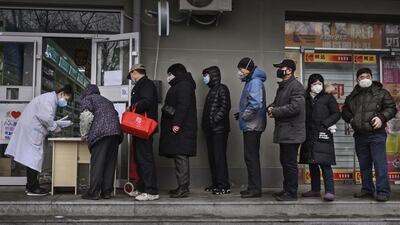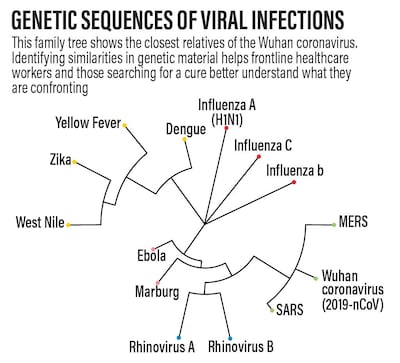The World Health Organisation declared the coronavirus outbreak a “public health emergency of international concern” last week, which means it is an “extraordinary event” that poses a risk to several countries.
It is only the sixth time that the organisation has used this term, suggesting a co-ordinated international response maybe needed to fight the disease.
In the UAE, health authorities confirmed five cases so far and urged the public not to spread rumours about the virus and follow updates only from official sources.
Officials also gave reassurances that precautionary measures were in place and there was no cause for panic.
But as new cases are reported each day globally, let's take a look at what we know about the virus so far, what may come next and how prepared are we if it were to ever become a global epidemic? The National explains.
How infectious is the nCov virus?
A study published last week in The New England Journal of Medicine found that every person who contracts the virus could infect two others.
This means it is more infectious than the 1918 influenza pandemic virus, which had an R-nought (R0) value – a measure of infectiousness – of 1.80 people compared to nCov’s rate of 2.2 people.
However, these are very early days in the development of the virus. Experts said the rate of infectiousness may not suggest doom, as much of what happens now depends on containment efforts.
China has locked down several cities, including Wuhan, the centre of the outbreak, to prevent its spread.
To contain the virus, several airlines have cancelled flights to China and some countries have refused entry to foreign nationals with a travel history to the country.
What could happen next?
This is one of the big unknowns.
According to official figures, there are 17,238 confirmed infections across China, Taiwan, Hong Kong and Macao. Researchers, however, suspect there may be tens of thousands of undiagnosed cases.
A study by the University of Hong Kong in the British medical journal, The Lancet, estimated that 75,815 people had been infected in Greater Wuhan alone as of January 25.
That study looked into the epidemic doubling every 6.4 days, based on calculations about how infectious the virus is, meaning nine days later, the numbers now exceed 151,630 in Wuhan alone.
Adding to that, there are now cases in every Chinese territory, suggesting more localised epidemics could be developing.
“On the present trajectory, 2019-nCoV could be about to become a global epidemic in the absence of mitigation,” said the study.
How deadly is it?
Of the 17,238 confirmed cases in China, 2,296 are said to be in a serious condition and 361 have died.
The numbers are suggestive of a fatality rate of around 2 per cent, which is much lower than nCov's coronavirus cousins, Sars and Mers, but significantly higher than seasonal influenza, which only kills around 0.10 per cent of the people it infects.
A number of studies have estimated fatalities among nCov confirmed patients in hospital to be much higher. A report by Hong Kong scientists, who studied early cases, suggest it can go up to 14 per cent.
However, they admitted it was difficult to assess the fatality rate at this time as most cases reported outside Wuhan have not been severe.
Therefore, “it would be reasonable to infer that there might be a large number of undetected relatively mild infections in Wuhan and that the infection fatality risk is below 1 per cent,” according to the study.
How long will the outbreak last?
That is another unknown.
Dr Michael Ryan, executive director of the WHO’s health emergencies programme said no “scientist nor sage on the planet that will tell you when the peak of this epidemic will occur.
“The peak will occur when the peak occurs,” he said.
Do UAE doctors think it will become a pandemic?
Opinions in the medical fraternity vary but largely the answer is a 'no'.
Dr Mahantesh Magadum, medical director at Burjeel Hospital in Sharjah, said the threat of a pandemic is overstated as it has only spread to 20 other countries as of today.
Of the countries that have reported cases, many have just one or two patients.
“I have my doubts if it’ll be of that magnitude,” he said.
Some said a widespread outbreak may be possible.
"It is taking the shape of a pandemic because it is spreading all over the world. We need to take precautions at this stage," said Dr Sanjiv Kumar Kakkar, paediatric specialist at Al Zahra hospital in Sharjah.
Dr Corina Weber, an internal medicine specialist at NMC Royal Medical Centre in Abu Dhabi, said the virus is worrying as it is a new strain, but the fact remains that it is mainly limited to China.
Preventive measures are in place to prevent new cases developing in the UAE.
“We are in a very safe country,” she said.
“The Department of Health is serious about it. We have had multiple briefings even before the virus hit our shores. We knew we had to trace a patient’s background and travels if he came to us,” she said.


















